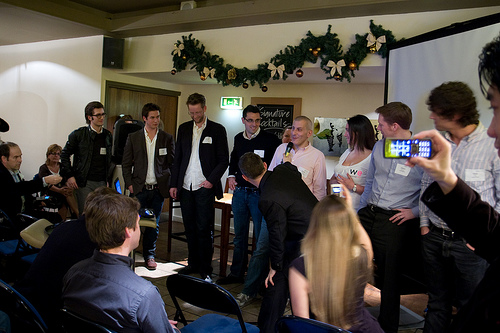Pitching A Business – TechCrunchTalk
This week’s TechCrunch event was a rare treat: 8 European startups pitching. TechCruncheMike Butcher gave the start ups 90 seconds to pitch their business. The ‘Tech Factor’ panel then responded to the pitch – in very civilised way. Finally the pitcher had 10 seconds to even the score… Erm… I mean clarify their pitch. I love preparing pitches and I love watching them even more, given that some of the companies had had some coaching, I was itching to listen.

The Pitchers
You can see the pitch videos in all their glory here on TechCrunch (and my photos of NewsPepper / TechFluff.tv’s Hermoine Way filming them here). I’m not going to say much about the companies themselves, watch the pitches or visit their websites if you want to know more :- BookingBug, CardCode, Jupidi Date-Coach, Rendezviewonline, Socialibrium, Soundcloud, Quick.tv and Worldeka – a very broad range of company types!

Here are my thoughts on giving effective pitches, based on watching the companies in action (interesting to compare with The 7 Habits of Highly Effective Pitchers from last time).
Tackle The Obvious
In any situation there will be some obvious questions. Make sure that you head these questions off by answering them or neutralising them (by making them irrelevant). The best way to find out what these questions are is understanding the interests of you audience, ideally by sounding out some friendly advisors who have a similar perspective. If you are pitching your business to an investor, they’ll want to know how your business is going to make money and increase in value. Pre-empt any objections you are likely to encounter, and handle them up front, and positively!
Win The Audience
In a 90 second pitches there isn’t enough time to convince your audience what a wonderful person you are. Actually, people do a worse job of this given more time. Win the audience over by proxy: Get a laugh or get to you will make my life better. If you can do that, you’re likely to seen as a good egg, even though we’ve don’t actually know you. Make sure we can see the benefit (to us). Soundcloud used a recorded testimonial from Hammer (aka MC Hammer) to kick off, which won the crowd’s attention. There was more social referencing, in listing the company’s big name investors. Nick Bell, from Quick.tv , used a shock joke to very good effect and won the audience with laughter – Nick went on to win the evening’s voting.
Get The Good Stuff in – Early
CardCode got the biggest reaction and cheer for something that wasn’t in their 90 second main pitch: that they had built a QR code reader for the iPhone. It only came out during the Q&A. In a real-world elevator pitch, you don’t know when you are going to run out of time, so don’t leave your most compelling benefits until the end or for next time. If you do, their might not be a next time. Be sure you understand what people are most likely to get excited about, and get it in early.
Be Conversational – Not Corporate
By conversational I mean two way communication, look at how your audience is reacting. Frame things in a way that engages people as individuals (avoid this list of phrases as a minimum: most annoying business speak phrases in the UK). Watching the crowd’s face during Socialibrium’s pitch was telling. The sizzle and the human element was missing. Jupidi’s Date-Coach pitch was very human, perhaps overly so! It got laughs and silence (intense listening!). Both apps were people-centric, but only Jupidi told the story from a human perspective. Socialibrium spoke from a business/corporate angle. Whatever your product or service, always talk about it’s emotional impact. You’ll get listened to more.
Where Were We? Oh… Don’t Get Side Tracked
You only have a short time, be polite, but don’t beat about the bush. This isn’t the time to get distracted or fall down a rat whole. Mike gave (most of) the speakers a “30-seconds to go” prompt. Each speaker dealt with that differently – some were quite distracted by it. Don’t be put off by time running out or by interruptions. Use your time as best you can. If you have 90 seconds and you spend 5 seconds of it lost in commentary about somethingelse, then that’s 5% of your time wasted. Whenever you are presenting, don’t make interuptions any bigger than they need to be. Deal with them if they need dealing with, but then get straight back on track.
Be Concise – Keep It Simple
An elevator pitch isn’t the time to be wordy or elaborate a complex idea. You might feel compelled to talk about the unique object-oriented approach to PHP coding that you used to build your app, but do I really need to know about that to get why your product or service is compelling? If I do, then you better go back and redesign it, because your heading towards a sales and marketing fail. Most struggling start ups I have encountered were held back because they didn’t have a good, solid elevator pitch. It usually took several hours to figure out what it was that they did and why it was beneficial enough to purchase or invest in. That isn’t a receipe for business success.

Last, but not least…
Have a compelling call to action at the end of your pitch. What’s next? A trial? A cash investment? Tell friends about the company?
Not a bad set of pitches, but I’m sure each of the companies will walk away with lessons to be learnt. Nick Bell of Quick.tv had the added benefit of walking away with a nice bottle as a prize!

